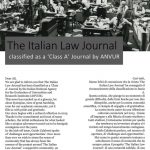This week in London, a woman was threatened with arrest at the Black Lives Matter protest in London for wearing a t-shirt emblazoned with the words “Fuck Boris”, in reference to the Prime Minister Boris Johnson. Given the conflict here between freedom of expression and statutory law, I’m especially interested in a comparison between English and Italian law.

Now, one might assume that here in the United Kingdom we have freedom of speech; unfortunately, it’s not quite so simple and it transpires that the police do have certain powers under Section 5 of the Public Order Act 1986, which refers to “harassment, alarm or distress”, and which states that a person is guilty of an offence if he “ (a)uses threatening [F1or abusive] words or behaviour, or disorderly behaviour, or (b)displays any writing, sign or other visible representation which is threatening [F1or abusive], within the hearing or sight of a person likely to be caused harassment, alarm or distress thereby.
The video records the policeman informing the woman that she must cover up her t-shirt, alleging that it is deemed harassment under Section 5 of the Public Order Act. As the woman, Jessie Lu-Flyn states, the policeman isn’t himself certain of the law, and amusingly takes out his iPhone to check it – an action that doesn’t exactly evoke confidence in the police, their knowledge of the law or indeed how it should be implemented.
A clash exists between the right of a person to wear what she wants, and her democratic freedom to make a political statement, and the interpretation of Section 5; as can be seen in the video, the policeman, from the British Transport Police, implies that should she fail to cover her t-shirt, she will be arrested.
Section 5 of the Public Order Act 1986 is considered on a case-by-case basis; Harvey v Director of Public Prosecutions [2011] All ER (D) 143 significantly impacted the development of the law; here, in the not unusual case in which the appellant had sworn during a police search, the court held that the word “fuck” is common and that there was no evidence that the police had been alarmed or distressed by its use; as such, the appeal was allowed. Nonetheless, in Southard v DPP [2006] EWHC 3449, the High Court held that the use of the word “fuck” remains potentially abusive. The citing of this case in Harvey v Director of Public Prosecutions suggests that the use of “fuck” remains potentially potent. However, the judgements show that circumstance and context remain relevant. The likelihood of the wearer of a politically charged t-shirt being found guilty of a breach of the law under Section 5 of the Public Order Act 1986 is extremely low, and suggests that the policeman in Jessie Lu-Flyn’s case was feeling particularly petty.
There are reports that the police in Manchester in the 1990s threatened people wearing t-shirts supporting the band The Inspiral Carpets, which featured a smiling cow cartoon and the logo “Cool as Fuck” under Section 5, and numerous cases since then have effectively held that the police reaction must be proportionate and take into account Article 10(2) of the European Convention on Human Rights, which protects freedom of expression- although this is qualified.

Italian Law and Parolacce
There are inherent difficulties in comparing Italian statutory law to the English common law, and it is impossible for all of life’s realities to be captured; nonetheless, similarities can be found. Italian contains numerous profanities, some of which are hugely creative, and which are referred to as bestemmie, primarily in reference to religious topics, or parolacce, where words are considered linguistically inflammatory. Without taking too much pleasure in the linguistic details, and for legal and informational purposes only (!), the Italian equivalent of the English “fuck” is “fottere”, which is used commonly in the expression “vai a fottere” (go and get fucked); “chiuvare” is a synonym commonly used in southern Italy.
Yet is it a reato – a crime – to swear in Italy, especially in writing on clothing. Italian law continues to consider swearing (bestemmiare) an administrative offence under Article 724 of the Codice Penale, the Italian Criminal Code, which reads “chiunque pubblicamente [266 4] bestemmia, con invettive o parole oltraggiose, contro la Divinità [o i Simboli o le Persone venerati nella religione dello Stato] è punito con la sanzione amministrativa pecuniaria da euro 51 a euro 309” (“Any person who publicly [266 4] blasphemes, with invective or offensive words, against the Divinity [or the Symbols or the Persons venerated in the religion of the State] shall be punished with an administrative fine of between € 51 and € 309“.
The original 1930 wording of Article 724 as introduced under Mussolini was concerned only with offence caused to Catholicism; however, over time this developed in relation to the different religious beliefs accepted in Italy; Sentence 440 of the Corte Costituzionale of 18 October 1995 ruled that only blasphemy against the “Deity” can be punished. Indeed, the use of religious imagery by artists in satirical art has been punished under Article 404 of the Penal Code; in 2017, the anonymous street artist Hogre was arrested in Rome for his depiction of a sexually aroused Jesus.
As the court stated (at 3.2) in Sentence No. 440 (1995) “si impone ormai la pari protezione della coscienza di ciascuna persona che si riconosce in una fede, quale che sia la confessione religiosa di appartenenza” (the equal protection of the conscience of each person who adheres to a faith, whatever their religious devotion, is now required”, and thus Article 724 was effectively rendered illegitimate.
In contrast to bestemmie, which are blasphemous, parolacce, or swearing, no longer constitutes a crime in Italy, following Legislative Decree No. 7/2016 and No.8/2016 (published in the Gazzetta Ufficiale (24.01.2016). This depenalizzazione also concerned the decriminalisation of other minor criminal offences such as speeding or running a red light, with the sanction reduced to a fine rather than a criminal record.
Now, it seems, those guilty of parolacce may be fined under the law concerning turpiloquio (or foul language) under Article 726 of the Criminal Code. Those deemed guilty of such minor misdemeanours may now be fined between 5000 and 10,000 EUR. However, in contrast to Section 5 of the Public Order Act 1986, Article 726 of the Italian Criminal Code states:
“Ai fini della integrazione del reato di cui all’art. 726 cod. pen. non è sufficiente che l’agente indossi un abbigliamento trasgressivo e spinto per arrecare offesa alla pubblica decenza, occorrendo invece che lo stesso accompagni all’uso di tali forme di vestiario comportamenti idonei ad offendere concretamente il bene giuridico tutelato” , which translates as: “for the purposes of the integration of the offence referred to in Article 726 of the Italian Criminal Code, it is not sufficient that the agent wears transgressive and aggressive clothing which causes offence to public decency, but it is necessary that he accompanies the use of such forms of clothing with behaviours that are capable of concretely offending the protected legal good”. Essentially, therefore, Article 726 of the Italian Criminal Code is used to punish acts which are considered contrary to public decency. Yet there is no statutory definition of this, and thus, as with Section 5 of the 1986 Act, the authorities enjoy a wide discretion, whether the swear words are written on a t-shirt or spoken in the street.





